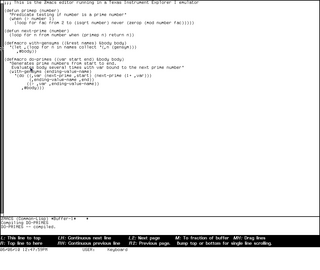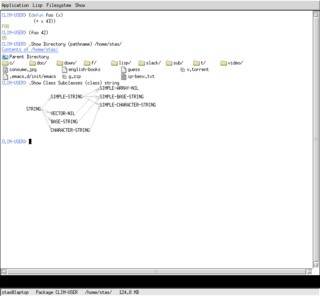Common Lisp (CL) is a dialect of the Lisp programming language, published in ANSI standard document ANSI INCITS 226-1994 [S2008]. The Common Lisp HyperSpec, a hyperlinked HTML version, has been derived from the ANSI Common Lisp standard.

Emacs Lisp is a dialect of the Lisp programming language used as a scripting language by Emacs. It is used for implementing most of the editing functionality built into Emacs, the remainder being written in C, as is the Lisp interpreter. Emacs Lisp is also termed Elisp, although there is also an older, unrelated Lisp dialect with that name.

Lisp is a family of programming languages with a long history and a distinctive, fully parenthesized prefix notation. Originally specified in 1958, Lisp is the second-oldest high-level programming language in widespread use today. Only Fortran is older, by one year. Lisp has changed since its early days, and many dialects have existed over its history. Today, the best-known general-purpose Lisp dialects are Racket, Common Lisp, Scheme and Clojure.

Lisp machines are general-purpose computers designed to efficiently run Lisp as their main software and programming language, usually via hardware support. They are an example of a high-level language computer architecture, and in a sense, they were the first commercial single-user workstations. Despite being modest in number, Lisp machines commercially pioneered many now-commonplace technologies, including effective garbage collection, laser printing, windowing systems, computer mice, high-resolution bit-mapped raster graphics, computer graphic rendering, and networking innovations such as Chaosnet. Several firms built and sold Lisp machines in the 1980s: Symbolics, Lisp Machines Incorporated, Texas Instruments, and Xerox. The operating systems were written in Lisp Machine Lisp, Interlisp (Xerox), and later partly in Common Lisp.
Symbolics is a defunct computer manufacturer Symbolics, Inc., and a privately held company that acquired the assets of the former company and continues to sell and maintain the Open Genera Lisp system and the Macsyma computer algebra system.
Maclisp is a programming language, a dialect of the language Lisp. It originated at the Massachusetts Institute of Technology's (MIT) Project MAC in the late 1960s and was based on Lisp 1.5. Richard Greenblatt was the main developer of the original codebase for the PDP-6; Jon L. White was responsible for its later maintenance and development. The name Maclisp began being used in the early 1970s to distinguish it from other forks of PDP-6 Lisp, notably BBN Lisp.
Lisp Machine Lisp is a programming language, a dialect of the language Lisp. A direct descendant of Maclisp, it was initially developed in the mid to late 1970s as the system programming language for the Massachusetts Institute of Technology (MIT) Lisp machines. Lisp Machine Lisp was also the Lisp dialect with the most influence on the design of Common Lisp.

Genera is a commercial operating system and integrated development environment for Lisp machines developed by Symbolics. It is essentially a fork of an earlier operating system originating on the Massachusetts Institute of Technology (MIT) AI Lab's Lisp machines which Symbolics had used in common with Lisp Machines, Inc. (LMI), and Texas Instruments (TI). Genera is also sold by Symbolics as Open Genera, which runs Genera on computers based on a Digital Equipment Corporation (DEC) Alpha processor using Tru64 UNIX. It is released and licensed as proprietary software.

Zmacs is one of the many variants of the Emacs text editor. Zmacs was written for the MIT Lisp machine and runs on its descendants. Zmacs is written in Lisp Machine Lisp. It is based on the ZWEI programming substrate, which stands for "Zwei Was EINE Initially"; Zwei was a collection of routines which could be used to easily implement other programs, like the Symbolics mail program, Zmail.
Flavors, an early object-oriented extension to Lisp developed by Howard Cannon at the MIT Artificial Intelligence Laboratory for the Lisp machine and its programming language Lisp Machine Lisp, was the first programming language to include mixins. Symbolics used it for its Lisp machines, and eventually developed it into New Flavors; both the original and new Flavors were message passing OO models. It was hugely influential in the development of the Common Lisp Object System (CLOS).
X3J13 is the name of a technical committee which was part of the International Committee for Information Technology Standards. The X3J13 committee was formed in 1986 to draw up an American National Standards Institute (ANSI) Common Lisp standard based on the first edition of the book Common Lisp the Language, by Guy L. Steele Jr., which was formerly a de facto standard for the language. The primary output of X3J13 was an American National Standard for programming language Common Lisp (X3.226/1994), approved December 8, 1994. X3J13 later worked with International Organization for Standardization (ISO) working group SC22/WG16 on an internationally standardised dialect of Lisp named ISLISP.
Lucid Incorporated was a Menlo Park, California-based computer software development company. Founded by Richard P. Gabriel in 1984, it went bankrupt in 1994.
Hemlock is a free Emacs text editor for most POSIX-compliant Unix systems. It follows the tradition of the Lisp Machine editor ZWEI and the ITS/TOPS-20 implementation of Emacs, but differs from XEmacs or GNU Emacs, the most popular Emacs variants, in that it is written in Common Lisp rather than Emacs Lisp and C—although it borrows features from the later editors. Hemlock was originally written by the CMU Spice project in Spice Lisp for the PERQ computer.
EINE and ZWEI are two discontinued Emacs-like text editors developed by Daniel Weinreb and Mike McMahon for Lisp machines in the 1970s and 1980s.

The Common Lisp Interface Manager (CLIM) is a Common Lisp-based programming interface for creating user interfaces, i.e., graphical user interfaces (GUIs). It provides an application programming interface (API) to user interface facilities for the programming language Lisp. It is a fully object-oriented programming user interface management system, using the Common Lisp Object System (CLOS) and is based on the mechanism of stream input and output. There are also facilities for output device independence. It is descended from the GUI system Dynamic Windows of Symbolics' Lisp machines between 1988 and 1993.
... you can check out Common Lisp Interface Manager (CLIM). A descendant of the Symbolics Lisp machines GUI framework, CLIM is powerful but complex. Although many commercial Common Lisp implementations actually support it, it doesn't seem to have seen a lot of use. But in the past couple years, an open-source implementation of CLIM, McCLIM – now hosted at Common-Lisp.net – has been picking up steam lately, so we may be on the verge of a CLIM renaissance. – From Practical Common Lisp
Multics Emacs is an early implementation of the Emacs text editor. It was written in Maclisp by Bernard Greenberg at Honeywell's Cambridge Information Systems Lab in 1978, as a successor to the original 1976 TECO implementation of Emacs and a precursor of later GNU Emacs.
Daniel L. Weinreb was an American computer scientist and programmer, with significant work in the environment of the programming language Lisp.
Bernard S. Greenberg is a programmer and computer scientist, known for his work on Multics and the Lisp machine.

Emacs or EMACS is a family of text editors that are characterized by their extensibility. The manual for the most widely used variant, GNU Emacs, describes it as "the extensible, customizable, self-documenting, real-time display editor". Development of the first Emacs began in the mid-1970s, and work on its direct descendant, GNU Emacs, continues actively as of 2020.
David A. Moon is a programmer and computer scientist, known for his work on the Lisp programming language, as co-author of the Emacs text editor, as the inventor of ephemeral garbage collection, and as one of the designers of the Dylan programming language. Guy L. Steele Jr. and Richard P. Gabriel (1993) name him as a leader of the Common Lisp movement and describe him as "a seductively powerful thinker, quiet and often insulting, whose arguments are almost impossible to refute".





